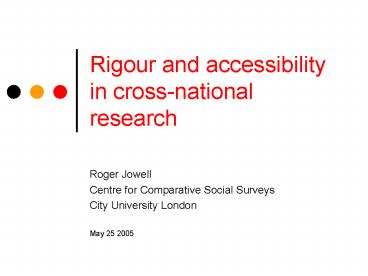Rigour and accessibility in crossnational research - PowerPoint PPT Presentation
1 / 12
Title:
Rigour and accessibility in crossnational research
Description:
exposes political, cultural and moral divisions ... 7 books, many articles, more dissertations. On-line bibliography and training. Conclusion ' ... – PowerPoint PPT presentation
Number of Views:41
Avg rating:3.0/5.0
Title: Rigour and accessibility in crossnational research
1
Rigour and accessibility in cross-national
research
- Roger Jowell
- Centre for Comparative Social Surveys
- City University London
- May 25 2005
2
The quest for rigour
- A longstanding problem, particularly for attitude
surveys (Eurobarometers, EVS, ISSP) - Involvement of the European Science Foundation in
the mid-1990s - A series of expert groups and committees
- Application to EC for part-funding - conditional
agreement - The start of the European Social Survey (ESS) in
2001
3
Three main aims
- To measure and explain long-term value change
within and between European nations - To improve the rigour of cross-national survey
methodology - To develop social indicators for Europe
(including attitudinal indicators)
4
Obstacles to attitude measurement in general
- Non-attitudes
- Social desirability bias
- Prevalence v salience
- The satisfaction conundrum
- Weather vs climate changes
- Impact of context
- In any case, attitudes are elusive, cheap,
changeable and cant be validated
5
Added problems for cross-national surveys
- Language differences that defy translation
- Differences in methodological habits
- Existing formulations to adhere to
- Differences in national contexts
6
On the other hand, monitoring social attitudes
- helps us understand how we see our world and
ourselves - challenges myths and stereotypes
- exposes political, cultural and moral divisions
- enables national success to be judged against
social, not just economic, criteria - Comparative sociology is not a branch of
sociology it is sociology itself (Durkheim)
7
25 participating countries
Denmark Greece Finland Italy Norway
Portugal Sweden Spain Iceland Austria
Belgium France Czech Rep
Germany Estonia Ireland Hungary
Luxembourg Poland Netherlands Slov
enia Switzerland Slovak Rep UK Ukraine
8
Main features
- Rigid specifications of
- Sampling method and size
- Fieldwork procedures and timing
- Response targets
- Event monitoring
- Translation protocols
- Progress and compliance monitoring
- Transparent documentation, easy access
- Top-down and bottom-up questionnaire design
9
Core question topics
- Trust in institutions
- Political engagement
- Socio-political values
- Multi-level governance
- Moral social values
- Social exclusion
- National, ethnic, religious id
- Well-being, health, security
- Demographic composition
- Education and occupation
- Financial circumstances
- Household circumstances
10
Rotating modules
- Round 1
- Immigration
- Citizen engagement and democracy
- Round 2
- Family, work and well-being
- Economic morality
- Health and care-seeking
- Round 3
- Indicators of quality of life
- Perceptions of the life course
11
Access and dissemination
- Archive NSD Norway - part and parcel of Central
Co-ordinating Team - Data available on-line and for download
- No privileged access
- 5000 users to date www.europeansocialsurvey.org
- US clone now funded
- 7 books, many articles, more dissertations
- On-line bibliography and training
12
Conclusion
- Herding cats can be fun
- (Jowell, 2005)































